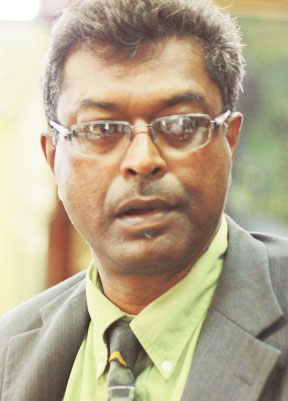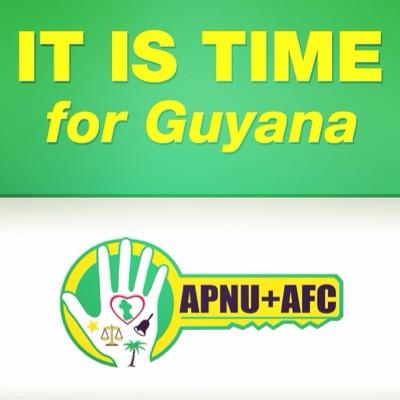A meeting yesterday between the two members of the governing APNU+AFC coalition ended with bright smiles and declarations of “excellent” as sources say the terms of a revised Cummingsburg Accord have been agreed for the 2020 general elections.
Sources tell Stabroek News that the AFC’s candidate Khemraj Ramjattan will hold the post of Prime Minister but will not become the President were that position to become vacant.
Ramjattan who was present at the meeting said that following the “excellent meeting” the parties will go to the polls as a coalition since “together is better”
“You ain’t see me smiling,” a beaming Ramjattan told reporters.
Also present was Presi-dent David Granger, APNU negotiator Volda Lawrence and AFC negotiator David Patterson.
The PM post had been one of several areas of contention with the AFC at one point declaring that negotiations had stalled due to APNU’s failure to accept Ramjattan as the coalition’s PM candidate.

However, a meeting between the two party leaders the next week appeared to settle the matter and negotiations continued until last Friday when the AFC declared that it would attend one more meeting on Monday November 18 to settle the formula for Ministerial appointments.
There was no meeting on that day, instead the APNU executive met and decided on a formula for the distribution of seats within that coalition. They also decided on the way forward in their negotiations with the AFC with President Granger continuing to declare that any terms agreed must comply with the constitution.
Sources have explained that following yesterday’s meeting it was decided that the AFC will be allotted five ministerial positions, less than the six they currently hold. The Agriculture portfolio currently held by the AFC’s Noel Holder appears to have been retained by the APNU.
Additionally it was agreed that President Granger would decide on the list of MPs.
Minister Lawrence though reticent to answer questions told reporters yesterday that the “coalition has always been strong”.
Patterson said “no comment”.
Asked for specifics of the meeting held at the Ministry of the Presidency, Lawrence said a press statement would soon be released. However up to press time none had been received.
In August the two partners indicated that they would revise the Accord claiming that the process should take approximately four weeks. The process instead dragged on for nearly three times that amount of time
Documents on the proposed terms were exchanged on August 27 but by September APNU insiders were declaring that AFC could not receive the same terms while the AFC maintained that the party is in a strong position to ask for the same or even better terms
“It is unrealistic, even to a political novice that the AFC could get the same terms as the last accord. Quite frankly, I believe that they will have to be prepared to give up a number of their current ministerial positions in exchange for that prime minister post that they so desperately are pushing,” an APNU source close to the process had told Stabroek News.
At the same time one AFC source said “We are going into the discussions in good faith, regardless of what you hear. We in the AFC still believe that we can get the same terms as the last accord. Many persons say that we don’t have bargaining power because of our performance at the LGE [local government elections], but the LGE and the general elections are not the same. Is APNU willing to risk our numbers and go it alone? Look at the margin at the last elections and tell me if APNU can win alone?”
Sunset
Seen as the key factor in the defeat of the PPP/C at the May 2015 general elections, the accord is a sunset agreement with a lifespan of a minimum of three years and a maximum of five years.
The key features were that the AFC would have the PM position in the government and 12 seats in Parliament.
Expecting similar benefits in any new agreement, the AFC in June selected Ramjattan, the Minister of Public Security, as its PM candidate following a bruising internal battle. However, it was later made clear by APNU that this was not a done deal.
Grumblings from hardliners within APNU – particularly its main component, the PNCR – that the AFC had gotten disproportionately high benefits from the accord had begun since 2015 and the renegotiation was seen as an opportunity to reel this in.
Meanwhile, the AFC had also been unhappy with its allocation of seats at the 2016 Local Government Elections (LGE) and had pressed at various points for an adjustment in this area.
APNU threw down the gauntlet and had the AFC contest the November 2018 LGE on its own in an apparent bid to have it show its real worth ahead of negotiations for a 2020 accord.
The poor showing of the AFC in those elections and its stance on a range of matters have been seen as diminishing its national standing and APNU hardliners calculated that since the AFC would bring no electoral advantage to the coalition in 2020 the coalition should look elsewhere for a PM candidate.
It has been suggested that Minister of State Dawn Hastings-Williams, who would appeal to both female and indigenous voters was among the candidates being considered.
AFC Vice Chairman Catherine Hughes however maintained that while many have declared the party dead, they are confident that the people of Guyana who have supported the AFC in the past, remain committed to their principles and the national development of Guyana.
“The Alliance for Change is a party of principle committed to the fundamental transformation of Guyanese society which includes healing and reconciliation, an end to racial voting, winner takes all politics and constitutional reform which we have preached since 2006,” she declared, adding that none of these issues were the subjects of the contest in the LGEs, which suffered from low voter turnout.
“In the absence of a discussion on these major issues, the AFC does not take the results of local government elections as indicative of where the party stands or its standing on major issues of national development,” Hughes argued, while Chairman Raphael Trotman posited that the 2018 results showed the population is not satisfied in seeing the coalition members “separate and apart.









